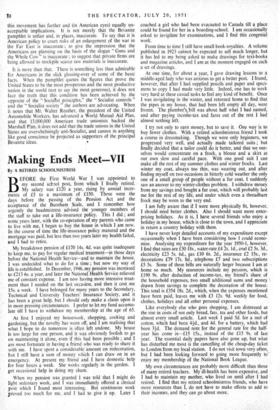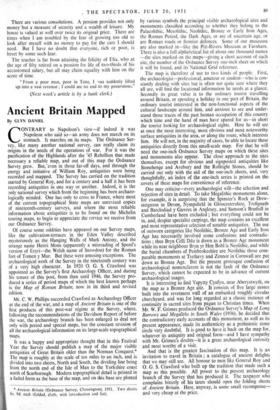Making Ends Meet VII
I3y A RETIRED SCHOOLMISTRESS
BEFORE the First World War I was appointed to my second school post, from -which I finally retired. My salary was £120 a year, rising by annual incre- ments of £5 to a maximum of £150. Those were the days before the passing of the Pension Act and the acceptance of the Burnham Scale, and I remember how urgently the headmistress advised the younger members of the staff to take out a life-insurance policy. This I did ; and some years later, with the co-operation of my parents who came to live with me, I began to buy the house in which I am now. In the course of time the life-insurance policy matured and the mortgage was paid, but less than two years later my health failed, and I had to retire.
My breakdown pension of £170 14s. 4d. was quite inadequate to keep me, to pay for regular medical treatment—in those days before the National Health Service—and to maintain the house. I was undecided what to do for a time ; but now my way of life is established. In December, 1946, my pension was increased to £213 6s. a year, and later the National Health Service relieved me of constant expense. I am now having more intensive treat- ment than I needed on the last occasion, and then it cost me 15s. a week. I have belonged for many years to the Secondary, Technical and University Teachers' Insurance Society, and it / has been a great help, but I should only make a claim upon it in more pressing circumstances. I prefer to let my fund accumu- late till I have to withdraw my membership at the age of 65.
At first I enjoyed my housework, shopping, cooking and gardening, but the novelty has worn off, and I am realising that what I hope to do tomorrow is often left undone. My house is too large for one person, and it was obviously foolish to go on maintaining it alone, even if this had been possible ; and I am most fortunate in having a friend who was ready to share it with me. I have spent a considerable"amount on redecoration, but I still have a sum of money which I can draw on in an emergency. At present my friend and I have domestic help for four hours a week. She works regularly in the garden. I get occasional help in doing my share.
When my pension was granted 1 was told that I might do light sedentary work, and I was immediately offered a clerical post which I found most interesting. But continuous work proved too much for me. and I had to give it up. Later I coached a girl who had been evacuated to Canada till a place could be found for her in a boarding-school. I am occasionally asked to invigilate for examinations, and I find this congenial work.
From time to time I still have small book-royalties. A volume published in 1923 cannot be expected to sell much longer, but it has led to my being asked to make drawings for text-books and magazine articles, and I am at the moment engaged on such a set of drawings.
At one time, for about a year, I gave drawing lessons to a middle-aged lady who was anxious to get a better post. I found, however, that after I had supplied pencils and paper and speci- mens to copy I had made very little. Indeed, one has to work very hard at these casual tasks to feel any kind of benefit. Once I was invigilating in the winter, and returned home to find that the pipes in my house, that had been left empty all day, were frozen. The plumbeesibill was about half what I had earned, and after paying income-tax and fares out of the rest I had almost nothing left.
I try not only to earn money, but to save it. One way is to buy fewer clothes. With a retired schoolmistress friend I took a course in dressmaking. Though we were only beginners, we progressed very well, and actually made tailored suits ; but finally decided that a tailor could do it better, and that we our- selves would concentrate on a frock, a blouse and a skirt at our own slow and careful pace. With one good suit I can make all the rest of my summer clothes and winter frocks. Last winter my coat, always too thin, was wearing out, and after finding myself on two occasions in bitterly cold weather the only one of a small group of people without a fur coat, I suddenly saw an answer to my winter-clothes problem. I withdrew money from my savings and bought a fur coat, which will probably last me for the rest of my life, and under which even a 'threadbare frock may be worn to the very end.
I am fully aware that if I were more physically fit, however, I should need better clothes. Also I should want more enter- prising holidays. As it is, I have several friends who enjoy a holiday in my house, which is close to the town, and I appreciate in return a country holiday with them.
I have never kept detailed accounts of my expenditure except occasionally when I have been considering how I could econo- mise. Analysing my expenditure for the year 1950-1, however, I find that rates are £30 18s., water-rate £4 2s. ld., coal £2 5s. 3d., electricity £23 5s. 6d., gas £10 a. 2d., insurance £2 15s., re- decorations £79 17s. 8d., telephone £7 and two subscriptions £5 5s. Some of these bills are naturally larger because I am at home so much. My resources include my pension, which is £190 9s. after deduction of income-tax, my friend's share of the household expenses, two small additional sums and money \ drawn from savings to complete the decoration of the house. This total is £354 18s. 2d., which, when the expenses mentioned have been paid, leaves me with £3 12s 9d. weekly for food. clothes, holidays and all other personal expenses.
Like everybody else who goes shopping, I am distressed at the rise in costs of not only bread, fats, tea and other foods, but almost every small article. Last week I paid 5d. for a reel of cotton, which had been 44d., and 4d. for a battery, which had been 31c1. The demand note for the general rate for the half- year has come in—£15 15s., instead of the £15 9s. of last year. The essential daily papers have also gone up, but what has disturbed me most is the cancelling of the cheap-day ticket to Londdn from my local station. I do not visit town very often, but I had been looking forward to going more frequently to– enjoy my membership of the National Book League.
My own circumstances are probably more difficult than those of many retired teachers. My ill-health has been expensive, and I had- to maintain my mother, who lived on until after I had retired. I find that my retired schoolmistress friends, who have more resources than I, do not have to make efforts to add to their incomes, and they can go about more. There are various consolations. A pension provides not only money' but a measure of security and a wealth of leisure. My house is valued at well over twice its original price. There are times when I am troubled by the fear of growing too old to look after myself with no money to pay for the care I should need. But I have no doubt that everyoUe, rich or poor, is beset by some such fear.
The teacher is far from attaining the felinity of Elia, who at the age of fifty retired on a pension for life of two-thirds of his accustomed salary, but all may claim equality with him on the score of time.
" From a poor man, poor in Time, I -vas suddenly lifted up into a vast revenue ; I could see no end to my possessions."
(Next week's article is by a bank clerk.)



































 Previous page
Previous page